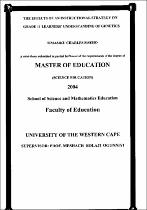The effects of an instructional strategy on Grade 11 learners understanding of genetics
Abstract
Research into learning genetics has largely focused on issues such as problem solving and the process
of meiosis. The central concept of genetics, however, has received very little attention despite the fact
that it is one of the concepts that learners find difficult (Ogunniyi, 1999; Bahar, Johnstone and Hansell,
1999; Collins and Stewart, 1989). In view of this, the specific purpose of this study was to investigate:
(l) concepts of genetics that grade I I learners hold before and after a period of instruction in genetics
(2) the differences in the understanding of genetics held by learners exposed to an instructional model
and those not so exposed; and (3) possible influences of gender, age, and language on grade I I
leamers' understanding of genetics. The method adopted for this study was a multidimensional
approach in which both qualitative and quantitative approaches were used to complement each other.
The role of the researcher in this study was that of the participant-as-observer. An induction workshop
was conducted for both the combined instructional teacher (i.e. experimental teacher) and the
traditional instructional teacher (i.e. control teacher) to help them explore and reflect on their practice
with the view to create in them an appreciation for multiple teaching strategies or traditional teaching
strategies to teaching and learning respectively.
Two schools and two teachers were used in this study. The instruments used in the study were pilot
tested in a school with similar characteristics to the two schools used in the main study. The
instruments used to generate data for the study include: Classroom Interactions Observation Schedule,
Structured Interviews with teachers and learners, Genetics Achievement Test (GAT), a Cloze Test and
Learner Worksheet. All the instruments were subjected to the rigour of triangulation to attain a high
level of validity, reliability as well as credibility. The findings of this study amongst other things
suggest differences in the interactions of behaviours of the experimental teacher and the control
teacher. The control teacher tends to out-talk the learners while the experimental learners tend to out-
talk their teacher. Also, the learners in the treatment group (experimental group learners) performed
significantly better than those in the control group. The study was premised on the socio-constructivist
epistemology, which construes the learning as knowledge construction based on one's interaction with
the leaming environment (Von Glasersfeld 1993; Mintzes dnd Wandersee, 1998). The constructivist
epistemology does not assume that the learner enters into the science classroom tabula rasa. Rather, it
assumes that the learner holds ideas and views about various phenomena based on prior experience
with the environment.

